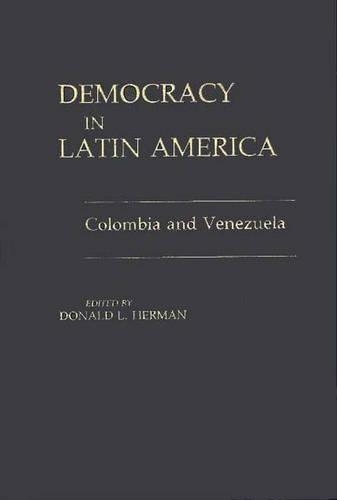
Democracy in Latin America: Colombia and Venezuela
(Hardback)
Publishing Details
Democracy in Latin America: Colombia and Venezuela
By (Author) Donald L. Herman
Bloomsbury Publishing PLC
Praeger Publishers Inc
30th March 1988
United States
Classifications
Tertiary Education
Non Fiction
320.9861
Physical Properties
Hardback
335
Description
Students of twentieth-century Colombia and Venezuela will find in the essays useful information on events taking place there through the mid-1980s. Teachers of Latin American government and politics will be able to use these essays as case studies of consociational democracy in the region. And all Latin Americanists will welcome the advent of scholarly writing informed by the consociational model that provides us an approach to contemporary Latin American politics that is at once enlightening and convincing. Southeastern Latin Americanist Venezuela and Columbia both have two-sided structures of democracy. They combine the Liberal Democratic/Anglo-American model and the Latin American model. The first includes the procedural norms of free elections, citizen participation, individual rights, and multi-interest groups. The second comprises the substantive norms of economic development and social justice. The contributors address the following questions: Is one or the other model more significant How much of a blending or overlap, if any, exists between these two models Is there a third model that is more significant In answering these questions, the contributors examine such principal components as national structures and societal evolution, political parties, economic development, the state and the military, guerilla movements, international relations and foreign policy, and the drug trade. Editor Donald L. Herman concludes this study by offering a prognosis for the two respective regimes for the rest of the twentieth century.
Reviews
Students of twentieth-century Colombia and Venezuela will find in the essays useful information on events taking place there through the mid-1980s. Teachers of Latin American government and politics will be able to use these essays as case studies of consociational democracy in the region. And all Latin Americanists will welcome the advent of scholarly writing informed by the consociational model that provides us an approach to contemporary Latin American politics that is at once enlightening and convincing.-Southeastern Latin Americanist
This well-edited scholarly book examines the bases for and the differences between the democracies of Colombia and Venezuela. That it succeeds is due in large part to its editor. Herman (Michigan State) has imposed a theoretical framework on a group of high-powered contributors and (unlike most edited works) has fit some disparate contributions into an explicitly comparative theory of democracy. The book is divided into four parts. After an introductory chapter by the editor, five chapters examine facets of Colombian democracy. The next four perform the same task for Venezuelan democracy, followed by four chapters that compare democracy in the two nations. The final chapter, also by Herman, probes the effect of the drug trade on the two democracies before moving on to a summation of the major themes which postulate that Latin American democracy must be measured by procedural and substantive norms, and that both Colombia and Venezuela fall short (Colombia more than Venezuela) of the second norm.-Choice
"Students of twentieth-century Colombia and Venezuela will find in the essays useful information on events taking place there through the mid-1980s. Teachers of Latin American government and politics will be able to use these essays as case studies of consociational democracy in the region. And all Latin Americanists will welcome the advent of scholarly writing informed by the consociational model that provides us an approach to contemporary Latin American politics that is at once enlightening and convincing."-Southeastern Latin Americanist
"This well-edited scholarly book examines the bases for and the differences between the democracies of Colombia and Venezuela. That it succeeds is due in large part to its editor. Herman (Michigan State) has imposed a theoretical framework on a group of high-powered contributors and (unlike most edited works) has fit some disparate contributions into an explicitly comparative theory of democracy. The book is divided into four parts. After an introductory chapter by the editor, five chapters examine facets of Colombian democracy. The next four perform the same task for Venezuelan democracy, followed by four chapters that compare democracy in the two nations. The final chapter, also by Herman, probes the effect of the drug trade on the two democracies before moving on to a summation of the major themes which postulate that Latin American democracy must be measured by procedural and substantive norms, and that both Colombia and Venezuela fall short (Colombia more than Venezuela) of the second norm."-Choice
Author Bio
DONALD L. HERMAN is Adjunct Professor of Political Science at the Center for Latin American and Caribbean Studies, Michigan State University.
